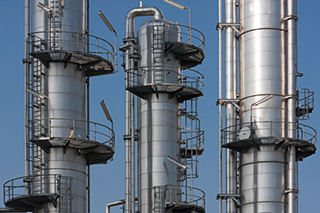Bioethanol
From the field into the tank
Bioethanol is obtained by the fermentation of sugars from plants containing sugar, starch and cellulosic parts. Typical feedstocks are currently maize, wheat, rye, sugar beet and sugar cane. For the future it should be possible to obtain bioethanol also from wood, straw or other cellulosic raw materials (see also: cellulosic ethanol) based on further development of innovative production processes. According to the type of feedstock different amounts of raw material are necessary to obtain 1 litre bioethanol (e.g. 2.2 kg of rye or 8.2 kg of potatoes). After harvesting the energy crop, the raw material is going to be pretreated in a bioethanol plant and fermented through the addition of yeast cells. After the fermentation process the residues can be used as animal feed (DDGS).
After the alcoholic fermentation the bioethanol is one of several substances within a aqueous mixture. Through distillation or rectification the alcohol is going to be separated from this mixture, which is possible due to different boiling points from ethanol (78.3°C) and water (100°C). Because of the azeotrop of water and ethanol a maximum ethanol content of 96% can be reached through distillation, with azeotropic distillation nearly 100% are possible.
Bioethanol serves as substitute fuel for petrol and can be used in any mixing ratio in so-called “Flexible Fuel Vehicles”. According to the duty of substitution of fossil fuels in Austria, 5% of bioethanol is mixed into petrol since 2007. Higher mixing ratios are possible, therefore adaptions on the automotive engine are necessary. A usual mixing ratio is “Superethanol”, a fuel with a bioethanol content of 85% (E85). A side-effect from this admixture is that the fuel becomes more antiknock, because of the higher octane number from bioethanol compared to petrol. In Austria the fuel norm ÖNORM 1114 is valid since July 2007 for E85. The higher the octane rating the rarer is the appearance of unregulated combustions in the engine bay with negative effects. But 1 litre of bioethanol substitutes only around 0.66 litre of petrol fuel.
Bioethanol – friend or enemy for the climate?
For bioethanol not only the agricultural production of raw material but also the conversion into fuel is related to high energy input. Especially the separation process after alcoholic fermentation is energy-intensive, due to high heat demand. Within the Austrian bioethanol plant (operated from AGRANA in Pischelsdorf), the required process steam originates from the nearby located thermal power station Dürnrohr.
The feedstock used for bioethanol production and the necessary agriculture effort for its cultivation have crucial influence on greenhouse gas emissions. In Brazil ethanol is made from sugar cane and the residues can be burned for energy production. Therefore fossil energy and associated greenhouse gas emissions can be saved.
According to a study of Joanneum Research Forschungsgesellschaft mbH, bioethanol produced by AGRANA in Austria brings down the greenhouse gas emissions compared to fossil fuel by 47%, if the raw material is wheat and by 51% using maize. This shows the (enormous) dependence of the ecobalance on the used resources and it reveals the contribution of Austrian bioethanol to climate protection.
Bioethanol – Made in Austria
In Austria there exists one largescale industrial bioethanol plant since 2008, which is able to cover the whole Austrian bioethanol demand. The annual production capacity of the AGRANA bioethanol plant in Pischelsdorf (Lower Austria) is 190,000 tons of bioethanol – the feedstock is mainly wheat, maize and sugar beet. According to AGRANA up to 620,000 tons of crops can be processed annually.
In 2009 138,073 tons of bioethanol were produced in Austria, which means nearly twice as much compared to the previous year. Furthermore 190,000 tons of residues remain after fermentation which are sold as animal feed and contribute to the reduction of soy imports from overseas. In Austria “Superethanol”, a mixture of 85% bioethanol and 15% petrol, is available at 27 filling stations. Superethanol is exempted from mineral oil tax and applicable without any difficulties in so-called “Flexi-Fuel-Vehicles”.

Ethanol distillation
(c) Agrana

